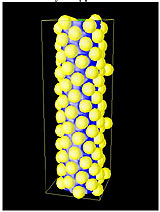By pooling its strengths in Soft Condensed Matter and Measurement Science and Characterisation, SUPA has created a major initiative to explore the creation of new nanocolloidal materials. Nanocolloids are particles whose size is measured in nanometres (millionths of a millimetre): this is much larger than an atom, but far smaller than the scale (microns) of the colloidal particles encountered in current technologies (e.g. paints). Nanocolloids offer new avenues for self-assembly of functional materials: for example by casting thin films of magnetic nanocolloids one might vastly exceed existing limits to the density of digital media that can be stored on hard-discs, DVD/RW and other devices. Longer term opportunities involve the assembly of three dimensional structures for catalysis and drug delivery, and even the creation of "nano-robotic" agents to perform bespoke functions, based on an understanding of nature's own nano-robots (molecular motors, enzymes and other intracellular machines).
A major intellectual and technical commitment within SUPA is to combine (i) Edinburgh's expertise in phase kinetics and self-assembly of colloids (and also in computer simulation and agent modelling); (ii) advanced characterisation and measurement science work at Glasgow, St Andrews and Strathclyde; and (iii) nanosynthesis of functional particles at St Andrews. Together we plan to create, control and understand new materials based on magnetic, biomimetic, and other functional nano-particles.
To learn of job opportunities relating to this initiative, visit SUPA Jobs Pages.
 |
Computer simulation of a nanocolloidal assembly: the colloidal particles (yellow) self-organize at the surface of a cylinder of fluid (blue) surrounded by another fluid (transparent). This creates a new stable structure: without particles, the cylinder would collapse. The particles were initially random but have spontaneously ordered into a helical crystal (R. Adhikari, Edinburgh). |